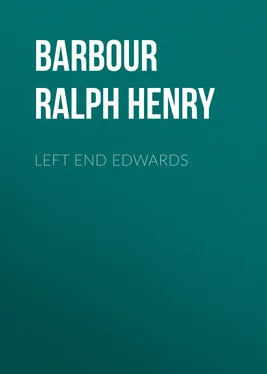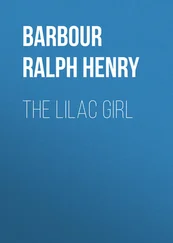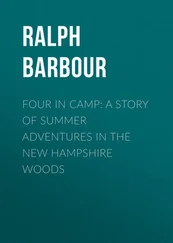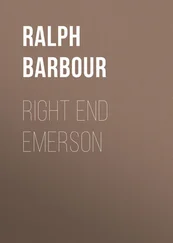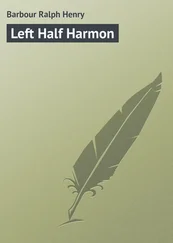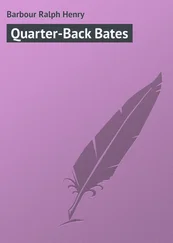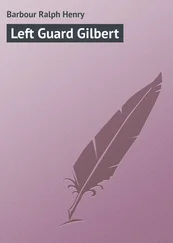Ralph Barbour - Left End Edwards
Здесь есть возможность читать онлайн «Ralph Barbour - Left End Edwards» — ознакомительный отрывок электронной книги совершенно бесплатно, а после прочтения отрывка купить полную версию. В некоторых случаях можно слушать аудио, скачать через торрент в формате fb2 и присутствует краткое содержание. Жанр: foreign_children, foreign_antique, foreign_prose, на английском языке. Описание произведения, (предисловие) а так же отзывы посетителей доступны на портале библиотеки ЛибКат.
- Название:Left End Edwards
- Автор:
- Жанр:
- Год:неизвестен
- ISBN:нет данных
- Рейтинг книги:4 / 5. Голосов: 1
-
Избранное:Добавить в избранное
- Отзывы:
-
Ваша оценка:
- 80
- 1
- 2
- 3
- 4
- 5
Left End Edwards: краткое содержание, описание и аннотация
Предлагаем к чтению аннотацию, описание, краткое содержание или предисловие (зависит от того, что написал сам автор книги «Left End Edwards»). Если вы не нашли необходимую информацию о книге — напишите в комментариях, мы постараемся отыскать её.
Left End Edwards — читать онлайн ознакомительный отрывок
Ниже представлен текст книги, разбитый по страницам. Система сохранения места последней прочитанной страницы, позволяет с удобством читать онлайн бесплатно книгу «Left End Edwards», без необходимости каждый раз заново искать на чём Вы остановились. Поставьте закладку, и сможете в любой момент перейти на страницу, на которой закончили чтение.
Интервал:
Закладка:
"The checks," murmured Steve, a look of uneasiness coming to his face.
"Haven't you got them?" asked Tom anxiously.
Steve nodded. "I've got them all right," he said grimly, "but these are the transfer company's checks. We—we forgot to get new ones at the station!"
"Thunder!" said Tom disgustedly. "Now what'll we do?"
"I'll look after it, gentlemen," said the driver comfortingly. "I'll have the agent telegraph the numbers back and they'll send 'em right along. It'll cost about half a dollar."
"Will we get them to-night?" asked Steve.
"You might. I wouldn't like to promise, though. Anyway, they'll be along first thing in the morning. Thank you, sir. Right this way to the carriage. I'll look after the bags."
"Not mine, you won't," replied Tom grimly, tightening his clasp on it. "I wouldn't trust the President of the United States with this bag. Anyway," he added as he followed Steve and the driver across the platform to a ricketty conveyance, "not if he lived in New York!"
By that time all the other carriages had rolled away, and while they waited for their driver to arrange with the station agent about the trunks they examined their surroundings. There wasn't much to see. The station was at the end of a well-shaded street, and beyond, across the right of way, the country seemed to begin. There were one or two houses within sight, set back amidst trees, and at the summit of a low hill the wheel of a windmill was clattering merrily. There were many hills in sight, all prettily wooded, and, on the whole, Brimfield looked attractive. They searched vainly for a glimpse of the school buildings, and the driver, returning just then, explained in reply to their inquiry, that the school was nearly a mile away.
"You could have seen it from the train if you'd been looking," he added. "It's about a quarter of a mile from the track on the further side there. Get-ap, Abe Lincoln!"
Their way led down the straight and shaded street which presently began to show houses on either side, houses set in small gardens still aflame with autumn flowers and divided from the road by neat hedges or vine-clad fences. Then there were a few stores clustering about the intersection of the present street and one running at right angles with it, and a post-office and a fire-house and a diminutive town hall. The old horse turned to the right here and ambled westward.
"You boys are sort of late," observed the driver conversationally.
"Why, school doesn't begin until to-morrow, does it?" asked Tom.
"No. I meant you was late for to-day. About twenty boys came this afternoon, most of 'em on the train before this one. There was Prouty and Newhall and Miller and a lot of 'em. You're new boys, though, ain't you?"
They acknowledged it and the driver nodded.
"Thought I didn't remember your faces. I got a good memory for faces, I have. Well, you're coming to a fine school, boys, a fine school! I guess there ain't another like it in the country. I been driving back and forth for nigh on twelve years and I know it pretty well now. Know lots o' the boys, too. Nice fellers, they be. Always have a good word for me. Generous, they be, too. Always handin' me a tip and thinkin' nothing of it."
Steve nudged Tom with his elbow. "That's fine," he said. "You must be pretty rich by now."
"Rich? Me rich?" The driver shook his head sorrowfully. "No, sir, there ain't much chance o' gettin' rich at this business, what with the high cost of feed and all. No, gentlemen, I'm a poor man and I don't never expect to be aught else. Get-ap, Abe Lincoln!"
The village, or what there was of it, had been left behind now and the road was winding slightly uphill through woodland. The sun was slanting into their faces, casting long shadows. Now and then a gate and the beginning of a well-kept driveway suggested houses set out of sight on the wooded knolls about them. The carriage crossed the railroad track and the driver pointed ahead of him with his whip.
"There's the school," he said; and the boys craned forward to see.
"Gee, but ain't it big!" muttered Steve.
CHAPTER V
NUMBER 12 BILLINGS
The woods had given way to open fields, and they could follow with their eyes the course of the road ahead as it turned to the left and ran, almost parallel to the railroad, past where a pair of stone gate-posts guarded the entrance to the Academy. From the gate a drive went winding upward, hidden now and then by trees and shrubs, to where, at the crest of a hill, a half-dozen buildings looked down upon them with numberless windows.
"That's Main Hall," said Tom, "the big one in the centre. I remember it in the catalogue."
"And that's the gym at this end," added Steve. "It's a pretty good looking place, isn't it? What's the building where the tall chimney is, driver?"
"Torrence. There's rooms upstairs and a dining-room on the first floor. That chimney's from the kitchen at the back. Then the building in the middle's Main Hall, as they call it. That was the original building. I remember when there wasn't any others. The one to the left of it's Hensey Hall. The fellows that lives there are called 'Chickens,'" chuckled the man. "Then there's Billings beyond Hensey, and The Cottage, where Mr. Fernald lives, is just around the corner, like. You can see the porch of it if you look."
But they couldn't, for at that moment the carriage turned to enter the gate and their view was cut off by a group of yellowing beeches.
Presently the carriage stopped in front of a broad flight of stone steps and the boys climbed out.
"Fifty cents, gentlemen," said the driver as he lifted the bags out. "Thank you, sir. Thank you , sir! I'll have your trunks up first thing in the morning. Just walk right in through the door and you'll find the office on your right. They'll look after you there. Much obliged, gentlemen. Any time you want a rig or anything you telephone to Jimmy Hoskins. That's me. Good-night, gentlemen, and good luck to you!"
Steve had contributed an extra quarter, which doubtless accounted for Mr. Hoskins' extreme affability. Bags in hand they climbed the well-worn granite steps and entered a dim, unlighted corridor. An open door on the right revealed a room divided by a railing, in front of which were a half-dozen wooden chairs and beyond which were two desks, some filing cabinets, a book-case, a letter-press, some chairs and one small, middle-aged man with a shining bald head which was raised inquiringly as Steve led the way to the railing.
"How do you do, boys," greeted the sole occupant of the office in a thin, high voice. "What are the names, please?" As he spoke he took a card from a pile in front of him and dipped a pen in the ink-well.
"Stephen D. Edwards, sir."
"Full name, please."
"Stephen Dana."
"Very good. Place of residence?"
"Tannersville, Pennsylvania."
"A wonderful state, Pennsylvania. Parents' names, please."
"Charles L. Edwards. My mother isn't living."
"Tut, tut, tut!" said the school secretary regretfully and sympathetically. "A great misfortune, Edwards. Now, you are entering by certificate?"
"Yes, sir, from the Tannersville High School."
"And your age?"
"Fifteen; sixteen in–"
"Fifteen will do, thank you." He drew out a drawer in a small cabinet set at the left of the broad-topped desk and ran his fingers over the indexed cards within it, finally extracting one and laying it very exactly above the one on which he had been setting down the information supplied by Steve. For a moment he silently compared the two. Then he nodded with much satisfaction. "Quite so, quite so," he said. "You will room in Billings Hall, Number 12, Edwards. You are provided with linen and other articles required?"
"Yes, sir, but my trunk hasn't got here yet."
Читать дальшеИнтервал:
Закладка:
Похожие книги на «Left End Edwards»
Представляем Вашему вниманию похожие книги на «Left End Edwards» списком для выбора. Мы отобрали схожую по названию и смыслу литературу в надежде предоставить читателям больше вариантов отыскать новые, интересные, ещё непрочитанные произведения.
Обсуждение, отзывы о книге «Left End Edwards» и просто собственные мнения читателей. Оставьте ваши комментарии, напишите, что Вы думаете о произведении, его смысле или главных героях. Укажите что конкретно понравилось, а что нет, и почему Вы так считаете.
